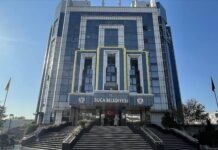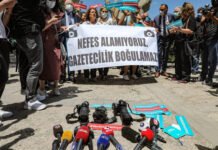The European Commission has stated in it 2018 report on Turkey that the Turkish government should lift an ongoing state of emergency without delay just as the country’s National Security Council (MGK) on Tuesday recommended the extension for another three months of emergency rule, introduced in the wake of a failed coup in 2016.
The European Commission released its most critical report yet on Turkey since the country launched its bid to join the EU over a decade ago. The European Commission warned that Turkey is taking “major steps” in the wrong direction and also that years of progress are being lost.
The report stated that “The state of emergency declared in the wake of the attempted coup of 15 July 2016 remains in force, aiming at dismantling the Gülen movement, designated by the government as a terror organisation responsible of the coup attempt, as well as at supporting the fight against terrorism, against the background of repeated attacks in Turkey, overall a traumatic period in Turkey.”
Reminding that the EU, which immediately and strongly condemned the attempted coup, reiterated its full support for the country’s democratic institutions and recognised Turkey’s legitimate need to take swift and proportionate action in the face of such a serious threat, the report said: “However, the broad scale and collective nature, and the disproportionality of measures taken since the attempted coup under the state of emergency, such as widespread dismissals, arrests, and detentions, continue to raise serious concerns. Turkey should lift the state of emergency without delay.”
The MGK’s recommendation to extend the state of emergency will likely be approved by Parliament. Extensions of the state of emergency have been approved six times since the attempted coup in July 2016.
Turkey is moving rapidly away from the path of European Union membership, European Commissioner Johannes Hahn, who is also in charge of negotiations, said on Tuesday, also calling on Ankara to lift its state of emergency.
Turkey “continues to take huge strides away from the EU, in particular in the areas of rule of law and fundamental rights,” Hahn told a news conference. “The commission has repeatedly called on Turkey to reverse this negative trend as a matter of priority and makes very clear the recommendations on this in today’s report,” he said.
Key findings of the European Commission’s 2018 Report on Turkey as follows:
“Serious shortcomings affect the 31 decrees taken to date under the state of emergency. They have not been subject to a diligent and effective scrutiny by parliament. Consequently, the decrees have long not been open to judicial review and none of them has yet been subject to a decision by the Constitutional Court. These emergency decrees have notably curtailed certain civil and political rights, including freedom of expression, freedom of assembly and procedural rights. They also amended key pieces of legislation which will continue to have an effect when the state of emergency is lifted.
Since the introduction of the state of emergency, over 150 000 people were taken into custody, 78 000 were arrested and over 110 000 civil servants were dismissed whilst, according to the authorities, some 40 000 were reinstated of which some 3 600 by decree.
A State of Emergency Appeal Commission became operational and received altogether some 107 000 appeal requests. This Commission only started to take decisions in December 2017 and it has so far provided redress to only few applicants. Its decisions are open to judicial review. It still needs to develop into an effective and transparent remedy for those unjustly affected by measures under the state of emergency.
Beyond the Appeal Commission, the capacity of Turkey to ensure an effective domestic legal remedy in the sense of the European Court of Human Rights (ECtHR) has been further undermined by a number of unfortunate precedents. In one instance a lower court refused to observe a ruling of the Constitutional Court regarding an emblematic case; a follow up ruling by the Constitutional Court for one of the defendants was eventually abided with by a lower court. Several court rulings favorable to prominent defendants, including Human Rights Defenders, were swiftly reversed by another or even by the same court, in some instances following comments from the executive.
Key recommendations of the Council of Europe and its bodies are yet to be addressed by Turkey. Allegations of wrongdoing need to be established by transparent procedures and on an individual basis. Individual criminal liability can only be established with full respect for the separation of powers, the full independence of the judiciary and the right of every individual to a fair trial. Turkey should lift the state of emergency without delay.
Regarding the political criteria, in April 2017, Turkey held a referendum which approved by a close majority constitutional amendments introducing a presidential system. The amendments were assessed by the Venice Commission as lacking sufficient checks and balances as well as endangering the separation of powers between the executive and the judiciary. The referendum itself raised serious concerns in relation to the overall negative impact of the state of emergency, the ‘unlevel playing field’ for the two sides of the campaigns and undermined safeguards for the integrity of the election.
Under the state of emergency, the Parliament’s key function as legislative power was curtailed, as the government resorted to emergency decrees with ‘the force of law’ to also regulate issues which should have been processed under the ordinary legislative procedure.In light of the worsening political frictions in the country, the space for dialogue among political parties was further narrowed in Parliament. Following the one-off lifting of parliamentary immunities in May 2016, many lawmakers of the opposition party HDP have been arrested and six of them were stripped of their seats.
The President role over the executive increased, following several transfers of powers to the Presidency through emergency decrees. The appointment of trustees to replace municipal executives and elected representatives led to an important weakening of local democracy.
Civil society came under increasing pressure, notably in the face of a large number of arrests of activists, including human rights defenders, and the recurrent use of bans of demonstrations and other types of gatherings, leading to a rapid shrinking space for fundamental rights and freedoms. Many rights‑based organisations remained closed as part of the measures under the state of emergency and an effective legal remedy has not been available with respect to confiscations.
The government overhauled the legal framework governing the civil-military relations and increased the powers of the executive over the military significantly, thereby strengthening civilian oversight. As part of the constitutional amendments, high military courts were effectively abolished. The military and intelligence services continue to lack sufficient accountability in Parliament.
The situation in the south-east has continued to be one of the most acute challenges for the country. The deteriorated security situation has in part shifted to rural areas. The government’s pledge to continue security operations, against the background of recurrent violent acts by the Kurdistan Workers’ Party (PKK), which remains on the EU list of persons, groups and entities involved in acts of terrorism, remained as a defining element of the situation in the region.While the government has a legitimate right to fight against terrorism, it is also responsible for ensuring the respect for human rights, rule of law, fundamental freedoms and the proportionate use of force. The government’s investment plan for the reconstruction of damaged areas in the south-east has resulted in the ongoing construction of thousands of dwellings but only few internally displaced persons received compensation so far. There were no developments on the resumption of a credible political process which is needed to achieve a peaceful and sustainable solution.
Turkey is moderately prepared in the area of public administration reform, with a strong commitment to a more open administration and the use of e-government. However, there has been serious backsliding in the area of public service and human resources management and in the area of accountability of the administration with regard to the right to administrative justice and the right to seek compensation. A transparent and effective remedy still needs to be provided for the large-scale dismissals.
Turkey’s judicial system is at an early stage of preparation. There has been further serious backsliding in the past year, in particular with regard to the independence of the judiciary. The Constitutional amendments governing the Council of Judges and Prosecutors (CJP) entered into force and further undermined its independence from the executive. The CJP continued to engage in large-scale suspensions and transfers of judges and prosecutors. No efforts were made to address concerns regarding the lack of objective, merit‑based, uniform and pre-established criteria in the recruitment and promotion of judges and prosecutors.
The Turkish legal framework includes general guarantees of respect for human and fundamental rights, which have however been further challenged and undermined by a number of emergency decrees. The serious backsliding on the freedom of expression continued, an area where Turkey is at an early stage of preparation. The scope of actions taken under the state of emergency has been extended over time to many critical voices, in media and academia amongst others, in contradiction with the principle of proportionality.
Criminal cases against journalists – more than 150 of them remain detained – human rights defenders, writers, or social media users, withdrawal of press cards, as well as the closure of numerous media outlets or the appointment by the government of trustees to administer them, are of serious concern and are mostly based on selective and arbitrary application of the law, especially provisions on national security and the fight against terrorism.
The Internet Law and the general legal framework continue to enable the executive to block online content without a court order on an inappropriately wide range of grounds. There was also serious backsliding in the areas of freedom of assembly, freedom of association, procedural and property rights. Freedom of assembly continues to be overly restricted, in law and practice. Measures adopted under the state of emergency also removed crucial safeguards protecting detainees from abuse thereby augmenting the risk of impunity, in a context where allegations of ill-treatment and torture have increased.
Emergency decrees imposed additional restrictions to procedural rights including on the rights of defence. The enforcement of rights is hindered by the fragmentation and limited mandate of public institutions responsible for human rights and freedoms and by the lack of an independent judiciary. Extreme poverty and a lack of basic necessities remain common among Roma households in Turkey. The rights of the most vulnerable groups and of persons belonging to minorities should be sufficiently protected. Gender-based violence, discrimination, hate speech against minorities, hate crime and violations of human rights of LGBTI persons are still a matter of serious concern.
The country has some level of preparation in the fight against corruption, where no progress has been achieved. The legal and institutional framework needs further alignment with international standards and continues to allow undue influence by the executive in the investigation and prosecution of high-profile corruption cases. Turkey’s track record of investigation, prosecution and conviction in corruption cases remained poor, particularly regarding high-level corruption cases. No progress was made in bolstering the accountability and the transparency in the work of public bodies. A broad, inter-party political consensus and strong political will are required to fight against corruption decisively. Turkey still needs to follow up on nearly all recommendations of the Council of Europe’s Assembly of the Group of States against Corruption. Corruption remains prevalent in many areas and continues to be a serious problem. Corruption perception also remains high.
Turkey has achieved some level of preparation in the fight against organised crime and some progress was made with the adoption of a new strategy and improved institutional capacity. Turkey needs to improve its legislation on cybercrime, asset confiscation and witness protection. Data protection legislation is in place but it is not yet in line with European standards. Financial investigations remain underused. Precautionary freezing of assets is rarely applied and the level of confiscated assets is low. In the fight against terrorism, a comprehensive legal framework on terrorism financing is in place. Both the criminal and anti-terror legislation need to be aligned with ECtHR case-law. The proportionality principle must be observed in practice.
Turkey made good progress in the area of migration and asylum policy and remained committed to the implementation of the March 2016 EU-Turkey Statement effective management of migratory flows along the Eastern Mediterranean route. As regards the implementation of the Visa Liberalisation Roadmap, at the beginning of February, Turkey submitted to the European Commission a work plan outlining how Turkey plans to fulfil the seven outstanding visa liberalisation benchmarks. The Commission is assessing Turkey’s proposals and further consultations with the Turkish counterparts will follow
Regarding regional cooperation, international obligations and relations with Member States, Turkey expressed support for the talks on the Cyprus settlement between the leaders of the two communities, and for the efforts of the UN Secretary-General and his Special Adviser. A Conference on Cyprus, convened in Geneva in January 2017 and in Crans-Montana in July 2017, closed without an agreement. Turkey has still not fulfilled its obligation to ensure full and non-discriminatory implementation of the Additional Protocol to the Association Agreement and has not removed all obstacles to the free movement of goods, including restrictions on direct transport links with Cyprus. There was no progress on normalising bilateral relations with the Republic of Cyprus.
The conclusions on Turkey that were adopted by the Council of the European Union and endorsed by the European Council in December 2006 remain in force. They stipulate that negotiations will not be opened on eight chapters relating to Turkey’s restrictions regarding the Republic of Cyprus and no chapter will be provisionally closed until the Commission confirms that Turkey has fully implemented the Additional Protocol to the Association Agreement.
Cooperation with Greece and Bulgaria on migration further intensified. However, tensions in the Aegean Sea and Eastern Mediterranean were not conducive to good neighbourly relations and undermined regional stability and security. Bilateral relations with several EU Member States deteriorated, including at times offensive and unacceptable rhetoric. In March 2018, the European Council strongly condemned Turkey’s continued illegal actions in the Eastern Mediterranean and the Aegean Sea and recalled Turkey’s obligation to respect international law and good neighbourly relations and to normalise relations with all EU Member States.The European Council expressed its grave concern over the continued detention of EU citizens in Turkey, including two Greek soldiers, and called for the swift and positive resolution of these issues in a dialogue with Member States.
Turkey needs to commit itself unequivocally to good neighbourly relations, international agreements, and to the peaceful settlement of disputes in accordance with the United Nations Charter, having recourse, if necessary, to the International Court of Justice. In this context, the EU has expressed serious concern and urged Turkey to avoid any kind of threat or action directed against a Member State, or source of friction or actions that damages good neighbourly relations and the peaceful settlement of disputes.
Economic criteria
The Turkish economy is well advanced and can be considered a functioning market economy. The economy supported by government stimulus measures, managed to recover from the contraction witnessed in the wake of the attempted coup of 2016 and achieved strong growth in 2017. However, high growth is coupled with significant macroeconomic imbalances. The current account deficit remains high and increased towards the end of 2017, making the country dependent on capital inflows and vulnerable to external shocks. Inflation moved to double-digit rates (11.1%) in 2017, and the depreciation of the Turkish lira continued, highlighting concerns over the degree of commitment of monetary policy decision-makers to price stability. The tendency to increase state control in the economic sphere and the actions targeting companies, businessmen and political opponents and their businesses harmed the business environment. Turkey’s economy continued to be characterised by a high level of informality. Overall, there was backsliding in this area.
Turkey has made some progress and has a good level of preparation to cope with competitive pressures and market forces within the EU. Turkey is well-integrated with the EU market in terms of both trade and investment. Some progress was made in the energy sector, particularly in the gas market, and in increasing R&D spending. However, significant problems remained with regard to the quality of education. There was no progress in improving the transparency of state aid.
EU legislation
Turkey has continued to align with the EU acquis, albeit at a limited pace. There have been more instances of backsliding regarding a number of key aspects in the areas of information society, social policy and employment and external relations. Turkey is well advanced in the areas of company law, trans-European networks and science and research and it has achieved a good level of preparation in the areas of free movement of goods, intellectual property law, financial services, enterprise and industrial policy, consumer and health protection, customs union and financial control.
Turkey is only moderately prepared on public procurement as important gaps remain in its alignment. Turkey is also moderately prepared in the area of statistics and transport policy where further significant efforts are needed across the board. Turkey has only reached some level of preparation in environment and climate change where more ambitious and better coordinated policies still need to be established and implemented. In all areas, more attention needs to be given to enforce legislation whilst many areas require further significant progress to achieve legislative alignment with the EU acquis.”
Turkey survived a controversial military coup attempt on July 15, 2016 that killed 249 people. Immediately after the putsch, the Justice and Development Party (AKP) government along with autocratic President Recep Tayyip Erdoğan pinned the blame on the Gülen movement.
Fethullah Gülen, who inspired the movement, strongly denied having any role in the failed coup and called for an international investigation into it, but President Erdoğan — calling the coup attempt “a gift from God” — and the government initiated a widespread purge aimed at cleansing sympathizers of the movement from within state institutions, dehumanizing its popular figures and putting them in custody.
Turkey has suspended or dismissed more than 150,000 judges, teachers, police and other civil servants since July 2016. Turkey’s interior minister announced on December 12, 2017 that 55,665 people have been arrested. On December 13, the Justice Ministry announced that 169,013 people have been the subject of legal proceedings on coup charges since the failed coup.
A total of 48,305 people were arrested by courts across Turkey in 2017 over their alleged links to the Gülen movement, Interior Minister Süleyman Soylu said on Dec. 2, 2017. “The number of detentions is nearly three times higher,” Soylu told a security meeting in İstanbul and claimed that “even these figures are not enough to reveal the severity of the issue.”
















[…] government led Islamist President Recep Tayyip Erdoğan is furious over the report released on Tuesday by European Commission which is the most critical one in the history of […]